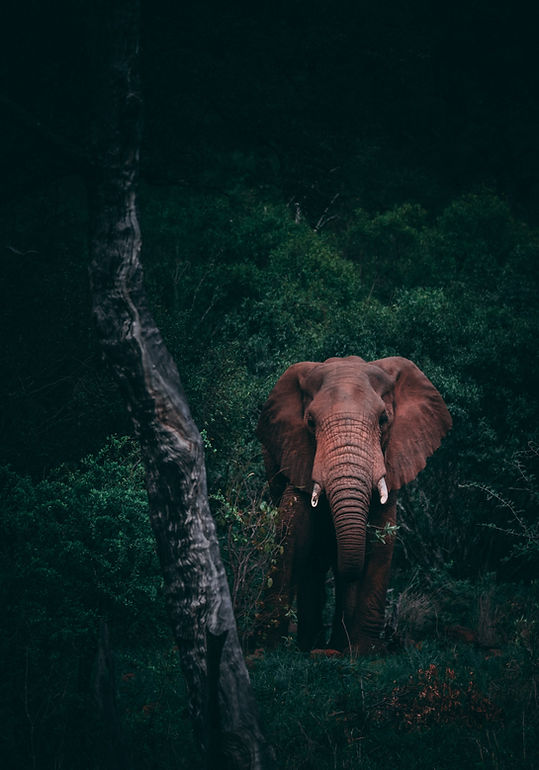top of page



Elephant Bean
A.K.A
Liberica



01
People around the world are in shock! Do elephant beans come from the excrement of an elephant that has been eating nothing but coffee nuts?
No. Not at all!
The Elephant Bean coffee does not refer to the coffee found in the rectal discharge of elephants! Elephant Bean Coffee was coined to the coffee grown in Malaysia (commonly known as the Big Fruit Coffee) because its seeds appear much larger and longer than the common coffee Arabica. Akin to the elephant - the largest terrestrial animal with the longest teeth among all animals, Big Fruit Coffee is the largest among its other coffee peers and has the longest seeds, which earns its reputation as the Elephant Bean Coffee.
In the past, the nomenclature of coffee was extremely lacking and limited in Malaysia. Coffee beans were often named after their geographical origins. For instance, coffee produced in Klang is simply termed Klang Coffee; coffee from Batu Pahat is acknowledged as Batu Pahat Coffee. However, these 'varieties' during the early days of Malaysian coffee production arose from the information gap and its resulting lack of naming unity; all coffee produced in Malaysia were all, in fact, Big Fruit Coffee. In the late 20th century, Mr Kiar Juan Pooh of Saikee 434 was the first person to coin the term Elephant Bean Coffee, ending the era of 'naming confusion' in the Malaysian coffee culture.

An endangered coffee plant - Elephant Bean coffee
Unfortunately, Elephant Bean Coffee as a species is facing the threat of extinction. Comprising less than 1% of the global coffee production, the Elephant Bean is now one of the rarest coffee despite its once glorious history.
Big fruit coffee, also known as Liberica, originated in Liberia, West Africa, was introduced to Malaysia by colonial forces around the 19th century and was welcomed by the local people. However, the cherry of Elephant Bean has a thick skin and fleshy texture; collecting 1 kg of the cherries can only yield no more than 100 g of coffee beans. In comparison, collecting 1 kg of Arabica cherries produces more than 300 g of coffee beans. Therefore, the Elephant Bean coffee cherry has at least 3 times lower economic values, due to its significantly lower yield. Moreover, elephant bean coffee is much more difficult to roast than other coffee varieties. Because the seeds are long and often irregular-shaped, skilled labour is required to prevent the scorching of the outer layer and the under-roasting of the core that could lead to unwanted waste of raw coffee.
As a result, elephant bean coffee plantation was superseded by the oil palm plantation, which brings higher economic values, leading to a plummet of Elephant Bean production in Malaysia. This also altered the coffee cultural landscape and the originality of Malaysian coffee.


Like many coffee drinkers, Mr Kiar Juan Pooh, the second generation of Saikee 434, resonated with their disappointment and believes that this would directly wipe out the rich Malaysian coffee history. He decided to promote the agriculture of Elephant Bean Coffee to restore the cultural identity of Malaysian coffee for all. In 2000, Kiar Juan Pooh bought a piece of land in Muar, Johor dedicated to growing elephant bean coffee plants. Despite being aware of the lower economic viability, he set forth to produce the real domestic coffee beans to both promote and preserve the coffee culture in Malaysia. The Elephant Bean Coffee Conservation Programme, one of his major efforts, was established to work directly with the government and the local coffee industry and actively collaborate with local farmers for Elephant Bean cultivation. Why all the hard work? To bring back the most missed, once ubiquitous Elephant Bean for everyone, he said.
It's Okay – The Launch of Elephant Coffee Bean Conservation Program!




What's so special about Elephant Bean coffee?
Compared to the usual coffee, the taste of Elephant Bean coffee is complex and one-of-its-kind. Taking the first sip, you are greeted by an explosive wave of aroma, followed by a trace of bitterness from the coffee that works harmoniously on your tongue. After swallowing, the bitterness dissipates, entailing a unique hint of mellow sweetness (some jokingly call it the fishy taste of an elephant), which lingers in your mouth for a prolonged period of time. The complex flavours–strong aroma, bitterness and sweetness are layered in a wonderful manner and are presented perfectly in just a cup of coffee. It tastes unlike any other coffee and is the reason why Mr Kiar Juan Pooh has dedicated his whole life to advocating and promoting Elephant Bean–the rarest coffee in the world.
bottom of page